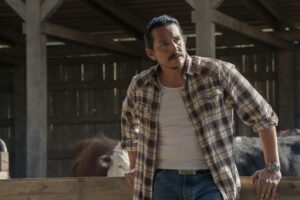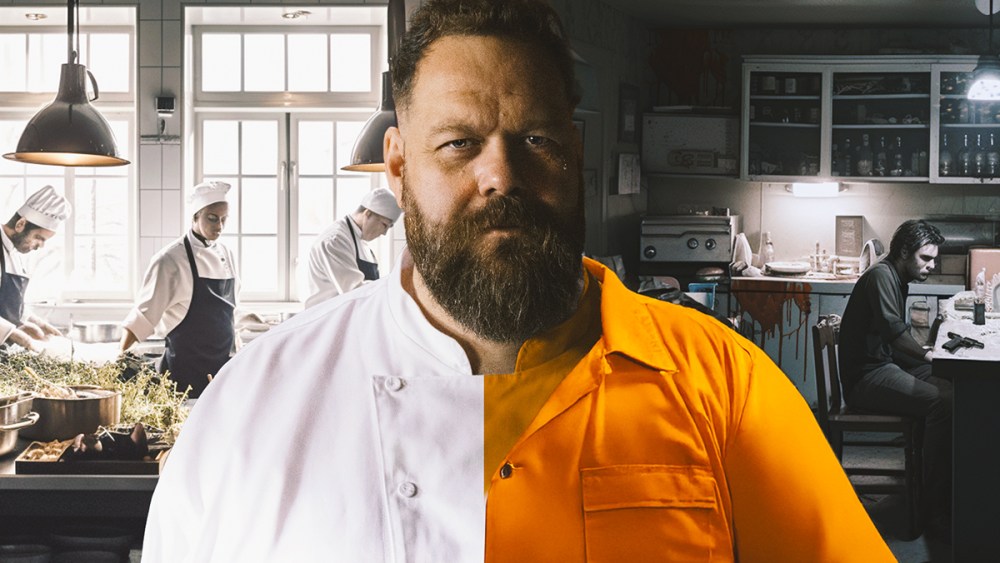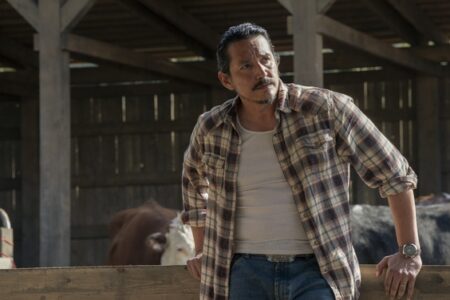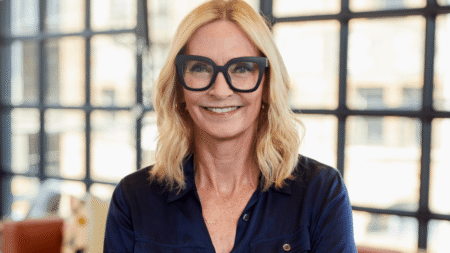Led by “Severance” star Ólafur Darri Ólafsson, “Reykjavic Fusion,” one of the highest-profile competition contenders at France’s Canneseries, is described by executive producer Erik Barmack of Wild Sheep Content as “‘Breaking Bad’ meets ‘The Bear.’”
When protagonist Jónas, a gifted chef imprisoned supposedly for tax fraud, gets out and opens a restaurant backed by a crime lord, his life becomes a daily exercise in damage control, as his life spirals into crime.
All Jonas wants is to develop his passion for haute cuisine, featuring “Icelandic ingredients cooked Asian style, with all kinds of secret twists,” as he explains to his fellow cons. But he’s soon a reluctant accomplice to murder and drowning with debt, jeopardizing his parole, life, and loved ones.
Chic, sleak, fast-paced, packed with action near unprecedented in Icelandic series such as car chases, “Rekjavik Fusion” plays out on a far larger canvas than nearly all Icelandic series.
Next to U..S/Icelandic star Ólafsson whose 100-plus credits range from “The Secret Life of Walter Mitty” and “True Detective” to “Trapped,” the Icelandic cast takes in Hera Hilmar (“Mortal Engines,” “The Oath”) as Mary, an unpredictable side-kick to the crime lord Kristján (Thröstur Leo Gunnarsson, “Driving Mum”) and his ex-fiancée Katrín, played by Lára Jóhanna Jónsdóttir (“Trapped”).
Teaming with Erik Barmack’s Wild Sheep Content, the show is the first project produced by Act4, Ólafsson’s banner set up in 2023 with producer Hörður Rúnarsson, creator-writer of the show, co-creator and writer Birkir Blær Ingólfsson and writer Jónas Margeir Ingólfsson. Alongside Icelandic commissioner Síminn and co-production partner Arte, broadcasters or platforms on board include AMC Iberia, Viasat, Yle, ERR and SBS. The domestic launch is set for this fall with The Mediapro Studio Distribution handling sales.
Variety sat down with Ólafsson and Rúnarsson at the Majestic Hotel in Cannes. Both talked moving away from the Scandi noir, their love for cooking and mixing U.S./European ingredients for a perfect fusion to be savored globally.
This is the first Icelandic series selected for Canneseries and first Act4 project. What does this mean to you?
Ólafur Darri Ólafsson: It’s hugely important to have the first Icelandic series competing here and it’s a big milestone for us at Act4. Getting a company off the ground is challenging but we’re happy that we’ve managed to do it and to have our first series here two years after launch.
Thanks to Hördur, Birkir, Jónas, and thanks to co-directors Samúel [Bjarki Pétursson] and Gunnar [Páll Ólafsson] who are experienced in commercials but had never done a series before, we wanted to break away from the traditional Scandi noir, do something that was a little feast, quickly edited.
How did you get the idea of mixing cooking with crime?
Rúnarsson: We set out to give a different flavour in terms of creatives, writing, cast and crew and we wanted a series which would be grounded in the city of Reykjavik.
Basically, I like cooking and my father was a chef. The idea for the show came originally from a conversation with a chef that I know. He was working at various restaurants and said: ‘I’m doing all the hard work with other guys making all the money.’ And then he said: ‘I even have a friend who came out of jail and he opened a restaurant! He cooked for some bankers who were in a small security prison that would supply all the fancy ingredients. So I was like ‘hum-that’s an intriguing story.’
Ólafsson: Yes it’s anchored in reality, much more than you think.
Hördur Rúnarsson and Ólafur Darri Ólafsson
Credit: Annika Pham
Could you describe your character, Jónas? What made him appealing to you?
Ólafsson: Basically, he goes to prison for a crime that he didn’t commit, but he’s not innocent in the sense that he’s been forced to serve time for what he’s done in life.
In Iceland, we have a saying for going to prison which means that you’re going there to become a better person. But the irony is that prisons are a place where you actually meet real criminals. Then we wanted to explore what happens when you come out of prison. Jónas, for instance, loses his family, his fiancée has cut ties with him and he doesn’t want his two kids to visit him in jail. He is full of shame. The only person that he’s really in contact with is his father. We were interested in exploring that. Going to prison supposedly to become a better person, but coming out and realising that society wants nothing to do with you. In Iceland thankfully [the prison system] is a hundred times better than in the U.S., where people lose the right to vote for instance.
That said, there’s a lot more to the story: the dynamic with his fiancée who has a new man in her life, with the latter acting as a father to his kids, then his relationship with his kids. Also, the character of Mary [the right-hand to the criminal who loans him money to open the restaurant] is hugely entertaining.
The key is how to engage the audience so that it will want to keep watching the show and root for your character. Could you expand on your multi-layered interpretation and body language which says so much more than words?
Ólafsson: Well, Jonas is constantly reacting to situations. That’s fun as an actor when stuff keep happening to you. I like Jónas as a multi-layered character, the fact that he’s flawed. As to the physicality, it comes instinctively with every part.
Generally speaking, now that you’re a household name as an actor and can probably pick your roles, how do you choose them?
Oláfsson: I’ve said it before but when I starting out in my acting career, perhaps in 2005, I worked with Stellan Skarsgård. I always looked up to him as a Scandi actor who had done everything [internationally], but kept working in Scandinavia. I picked up a lot from him. I asked him: “Don’t you want to work with the Coen Brothers? He said: ‘For me, what matters most is to see if I can add value to the story that’s being told.
I always try to hold on to that. Then other elements come into play: who else is in it, the money, whatever.
Also, sometimes people say actors can play any part. I don’t really agree with that. You can do incredible things, but there are certain parts that matter more, according to where you are in life. Anytime you do a role, you’re using your experience and knowledge.
In short, when I choose a part, I follow my guts. I read the story, and if I think I can make the story better then it’s attractive to me.
What did you dig from your inner-self to play Drummond in “Severance” then?
Ólafsson: I think there was a lot (laughs)! I was actually thinking of the people who terrify me when I was playing Drummond. We have a certain government now in the U.S., and we are in an interesting place where some people seem to be true believers and would do anything for a certain individual. I think Drummond is that kind of individual and murder would not be the least of it! That drew me to that character. It is fun as an actor to put yourself in a mindset of someone that you wouldn’t necessarily be.
I also did a show called “Nine Bodies in a Mexican Morgue” last year [for MGM+] where I played a guy who really believes in Trump and in stolen elections. It was incredibly enjoyable. It was not about making him a stereotype. People believe in all kind of stuff and sometimes they learn the hard way that it was complete bullshit.
The show is co-produced by Wild Sheep Content’s Erik Barmack on one hand, and Arte on the other hand. You’re like a hinge between the U.S. and Europe and you’re mixing U.S. and European narratives. Would you agree with this?
Rúnarsson: Absolutely. It’s a combination of the two and Iceland in many ways is in between the U.S. and Europe. We look towards the U.S., although we’re in the Nordics.
Olafur Darri, as a U.S./Icelander, do you feel also split between the two or definitely rooted in Iceland?
Ólafsson: I’ve worked quite a bit in the U.S., but I’ve always kept my base in Iceland and never saw any reason for leaving. When I started working, the world had just opened up to self-tapes and people kept saying: You have to move to L.A. to break out internationally. Now, it’s all changed. No one has to live in L.A. and sadly, there are far too few shoots going on there these days. With Act4, we’re proud to pull together those two worlds.
Going back to the show, from the first image, cooking on screen opens up our senses and appetite. I believe you had a Michelin Chef – Þráinn Freyr Vigfússon – as a consultant. How was it to work with him and do you personally love cooking?
Ólafsson: Cooking is a blend between meditation and chemistry. It’s the perfect thing. At the end of a working day, you go somewhere and start cooking. I usually put some good music, and if you’re lucky, you open up a bottle of red and have a glass. My family loves when I cook my pasta bolognaise or boeuf bourguignon.
I love eating good food, good company. What happened is that I was introduced to this chef Þráinn who runs two restaurants in Reykjavik – Óx and Sümac – and got to know him quite well. I felt he would be perfect as a consultant and he did go above and beyond, designing the whole menu for the restaurant and cooking the food on set. He was in the kitchen, making me look so good!!
What’s next for Act4?
Ólafsson: We have a new series called “Death of a Horse” [part of the New8 Alliance, commissioned by RÚV]. It’s a murder mystery with a twist in the sense that, the murder victim is a horse. The owner makes an insurance claim and starts investigating. That creates an interesting premise as it questions our relationships to animals – cats, dogs or horses – especially in Iceland – that we consider as being part of our family and certainly a big part of our lives.
Will you act in it?
Ólafsson: No. I will leave it to other people. We have a wonderful pool of actors to choose from in Iceland. Jonas and Birkir are showrunners.
Rúnarsson: Financing is locked and we’re shooting in July. We’ll soon announce our sales partner.
Read the full article here








